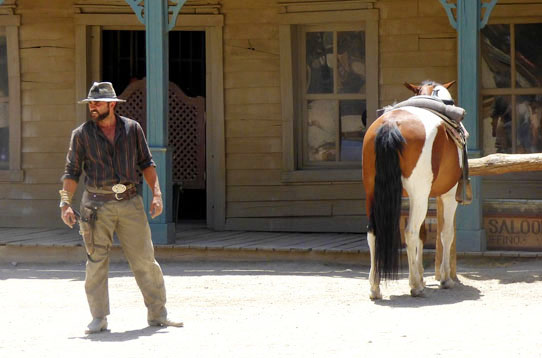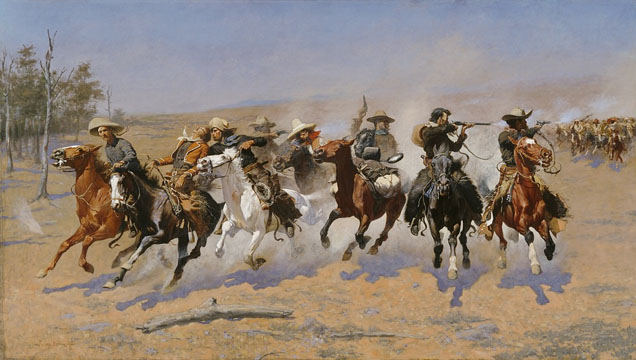
American Individualism in the Age of Donald Trump by Dr Namrata Goswami, Senior Analyst and Minerva Grantee.
“I believe there is no man to whom I would take second position in my loyalty to the Republic of the United States, and yet I would not give it more power over the individual citizenship of our country” – Samuel Gompers, Montreal, 1920.

In a lively response to my piece in Live Encounters Magazine, titled, “America at Crossroads?”,[1] a friend of mine from Alabama gently pointed out that while he liked my conclusions as to who I believed won from the election of Donald Trump [the nativists and the nationalists], but that I had omitted a category he thought won as well, and to which he identified himself with: individualism. That got me thinking as to what individualist philosophy signifies in the American political landscape historically and specifically in the age of President Donald J. Trump. Significantly, in a Pew Research Survey conducted in 2011, Americans topped the list when it came to individual liberty versus state guarantees. 58 per cent of Americans believed that individuals should be free to pursue their goals without any state interference. In comparison, developed countries like the U.K (55 per cent), Germany (62 per cent), France (64 per cent) and Spain (67 per cent) believed that the state should ensure and guarantee that nobody is in need.[2] 57 per cent of Americans believed that individuals enjoy the agency to change the course of their lives and 73 per cent of Americans believed that it is “very important to work hard to get ahead in life”.[3] In comparison, 49 per cent of Germans, 47 per cent of Spaniards, 35 per cent of Italians, 25 per cent of French, and 21 per cent of Greeks believed that it is very important to work hard to get ahead in life.[4]
Through my research and subsequent conversations with Trump supporters, I discovered that it is this belief in working hard, carving their own paths to the American dream of ‘rags to riches’, besides nationalism and nativism, that drove them to elect Trump, President. To them, Trump embodied ‘individualism’, with his ‘America first campaign’ and by highlighting during his campaign speeches, the tendency of minorities and immigrants, to identify with group rights and group identity, viewed as adversative to what America has historically stood for: a concept of ‘rugged individualism’, almost primal to how Americans view themselves; that frontier spirit of the ‘rugged cowboy’ battling the odds of nature alone on his horse. [5] Trump portrayed himself as an individualist, who funded his own campaign, was not beholden to any donors in comparison to his rival, Hilary Clinton; was not an establishment man; and was largely successful through his own efforts: “a self-defined paradigm of independence”.[6]
This individualistic spirit, overcoming all odds, is portrayed in popular American culture and movies, and is celebrated. Individualists perceive their freedoms as supreme, and are concerned that others may hinder their individualistic progress. Trump played into that fear by projecting the outside world (immigrants and Muslims),[7] by asserting that these groups cling to their native cultures and threaten to change America’s individualistic creed with their personal laws, group ideologies and identities.[8] While some would argue that Trump supporters are themselves ‘in-group’ focused, and ethnically Caucasian, there is substantive counter research that shows that many of these Trump supporters had voted for Barack Obama in 2008 and 2012.[9]
This brings us to the idea of ‘individualism’ or ‘rugged individualism” that perhaps motivated Americans to vote for Trump in November 2016. What does it mean, what are its origins, and are they one and the same?
History of “Rugged Individualism”
The use of the term ‘rugged individualism” goes back to former President, Herbert Hoover, who defined it as “freedom from government intervention and focus on individual entrepreneurship, enterprise, and volunteerism.”[10] He contrasted this with European state socialism and paternalism. Hover argued that individual freedom was critically connected to eliminating poverty, asserting that the concept of self-government, liberty and equality of opportunity based on individual freedom, made America an unparalleled example of human welfare and well-being. Freedom is directly connected to individual happiness. This included freedom of initiative and enterprise that propelled people to establish the path to their own success.[11] Hoover championed decentralization and self-government. Businesses to progress, requires competition, and that can only come by individual enterprise and initiative, he argued. Without individual adventure, there is no progress.

“Pull yourself up by your bootstraps”, is an idea based on American individualism and the American dream. It embodies ‘work hard and change your life’s course from rags to riches’.[12] Ayn Rand, the famous American author, embodied this when she wrote: “each man exists by his own right and for his own sake, not for the sake of the group”. She contrasted this idea with the collectivism of groups which says: “each man exists only by the permission of the group and for the sake of the group”. Policies like ‘affirmative action’ are viewed by individualists as encouraging group culture, entitlements and privileges based on a person being member of a group, and is against that individualistic creed.[13] This individualist culture believes the individual is supreme. This idea percolates to ideas of justice, which signifies that individuals enjoy rights and privileges, and groups cannot be a determining factor in actions related to justice. Redistribution of resources to create social equality based on a group identity is thereby viewed as unfair to individual rights.[14] And hence these individualists supported Trump, who in one of his tweets stated “the most important truth our founders understood was: Freedom is not a gift from govt. Freedom is a gift from God”.[15] Trump’s campaign promises to protect the Second Amendment Rights, especially law-abiding gun-owners’ individual rights to their weapons they believe they own to defend themselves against the tyranny of the government,[16] drew huge support. These gun owners see themselves as individuals and view the Second Amendment rights as their hard-earned individual rights enshrined in the ‘Bill of Rights’.[17]
In a similar mold, the 2010 Affordable Care Act, nicknamed Obamacare, is viewed as group access to healthcare, superseding individual choices.[18] Hence, the resistance to universal health care, which is perceived as a ‘group based’ idea. More so the resistance, because it has been made mandatory with increasing monthly premiums.[19] More on this aspect later. Significantly, what is starkly missing from this individualistic perspective is the issue of racism, especially as it embodies the ‘frontier spirit’ of mostly the Caucasian male, when ‘individual rights’ were denied to African Americans and indigenous communities. Discrimination against individuals were clearly based on they being part of a specific group, while those who discriminated were part of a group that championed selective individual rights. Moreover, while the idea of ‘affirmative action’ is perceived ironically as a privilege based entitlement, given the history of oppression and injustices that ensued to people of a different ethnicity, that perspective is somewhat misplaced.
That said, the aim of this article is to avoid digging holes into a certain perspective. Rather, the purpose is to understand why individualists believed they won from Trump’s elections. Relevantly, their voting pattern revealed that it was not always based on race or ethnicity but the idea of ‘rugged individualism’ that Trump championed. Trump successfully rebuilt that nostalgia for grandiosity of the individual spirit and a romance of the past, whereas Obama and Hilary Clinton were both viewed as supporters of big governments.[20]
Significantly, it was this spirit of individualism that was advocated in a paper presented by Frederick Jackson Turner, in Chicago in 1893, stating:
This perennial rebirth, this fluidity of American life, this expansion westward with its new opportunities, its continuous touch with the simplicity of primitive society, furnish the forces dominating American character. The true point of view in the history of this nation is not the Atlantic coast, it is the Great West…frontier individualism has from the beginning promoted democracy. That coarseness and strength combined with acuteness and inquisitiveness; that practical, inventive turn of mind, quick to find expedients; that masterful grasp of material things, lacking in the artistic but powerful to effect great ends; that restless, nervous energy; that dominant individualism, working for good and for evil, and withal that buoyancy and exuberance which comes with freedom. these are traits of the frontier, or traits called out elsewhere because of the existence of the frontier. [21]
Yet Turner cautioned as well:
So long as free land exists, the opportunity for a competency exists, and economic power secures political power. But the democracy born of free land, strong in selfishness and individualism, intolerant of administrative experience and education, and pressing individual liberty beyond its proper bounds, has its dangers as well as its benefits. Individualism in America has allowed a laxity in regard to governmental affairs which has rendered possible the spoils system and all the manifest evils that follow from the lack of a highly developed civic spirit. [22]
The positive individualistic trend was famously broadcasted by Former President Ronald Reagan, who stated that America thrived when it “unleashed the energy and individual genius of man.” [23] The excessive growth of government led to the stifling of individual talent, creativity and innovation, and hence the state should get out of the way. This growth in individualism is linked back to when Democrat President Franklin Roosevelt established the “New Deal” regulating business, guaranteeing worker stability and promoting social welfare; policies that were extended by his Republican successor, Dwight Eisenhower.[24] This lead to a counter-movement, the Conservative Movement, that championed free market capitalism, individualism and the values based on the Bible. According to the founder of the conservative movement, William F Buckley Jr, the government’s job was to simply do three things: protect lives, liberty and property. Rest should be left to the individual. The conservative movement viewed government interference in ensuring racial equality as an attempt to foment group rights and thereby severely harmed the hard-working individual. Its core was especially conservatism’s marriage with the idea of the western cowboy.[25]
It is, however, important to understand that the American idea of ‘rugged individualism’ does not mean self-absorption, or a mercantilist approach. America’s ‘rugged individualism’ runs alongside ‘equal opportunity’ and is a philosophy that draws its roots right to the start of what is an American character. Most importantly, American ‘rugged individualism’ is not about self-isolation or greed that somehow needs to be regulated by the state. Rugged individualism is best tied to the idea of the ‘frontier spirit’ of adventure towards the unknown, and this includes the attachment to fictional outer-space series like Star Trek, that celebrates ‘a journey to the final frontier’. Frontiers include political, social or economic frontiers that are new and challenging. Significantly, ‘rugged individualism’ celebrates human achievements based on self-effort, and is against a social welfare state.[26] Hoover drove this point home when he stated:
During one hundred and fifty years we have builded (sic) up a form of self-government and a social system which is peculiarly our own. It differs essentially from all others in the world. It is the American system. It is just as definite and positive a political and social system as has been developed on earth. It is founded upon a particular conception of self-government in which de-centralized local responsibility is the very base. Further than this, it is founded upon the conception that only through ordered liberty, freedom and equal opportunity to the individual will his initiative and enterprise spur on the march of freedom and equal opportunity to the individual will his initiative and enterprise spur on the march of progress. And in out insistence upon equality of opportunity has our system advanced beyond all the world.[27]
Significantly, President Trump, while projecting himself as a rugged individualist, that embodies that age-old American frontier spirit, embodies more a nativist/nationalist spirit. He believes in an idea like “America first” which is at best both nationalist and nativist, inward looking, based on fear of the unknown and shuns adventure, aims to limit access to people based on religion, and is bullish on patriotism, like standing up for the national anthem. His speeches during the campaign, were based on stoking fear and division, and rarely talked about that wonderful frontier spirit of ‘rugged individualism’. That said, neither are Bernie Sanders and Hilary Clinton champions of ‘rugged individualism’. Sanders is a democratic socialist who champions a welfare state where the government would be responsible for social welfare and regulate business; Clinton is part of the establishment, and like the ‘New Deal’ progressives, advocates a more collectivist government. She champions increased federal spending for human welfare.[28] Neither was former President Barack Obama a champion of ‘rugged individualism”. He argued that while it is in the American mindset, sometimes state intervention is required to establish a ‘level’ playing field. This is embodied in his statement defending Obamacare, “The rugged individualism that defines America has always been bound by a set of shared values; an enduring sense that we are in this together. That America is not a place where we simply ignore the poor or turn away from the sick. It’s a place sustained by the idea that I am my brother’s keeper and I am my sister’s keeper.” [29]
Yet, rugged individualism is starkly different from what Obama made it out to be. Instead it champions self-reliance and giving power back to the people. Hoover, during his 1928 presidential campaign, argued for giving federal power accumulated during the First World War, back to the people. To be sure, rugged individualism includes collaborations through community and church and other human beings, in fact, quite strongly, but these community collaborations are always voluntary and never imposed by the state. The idea of America began with the individual, and the founding fathers celebrated that individual spirit and embodied it in the Constitution. Everything else flowed from it, including state institutions. And as Hoover warned, state cannot establish limits on this ‘rugged individual’ based on individual freedoms to taking over healthcare and education. The American idea of ‘checks and balances’ was based on protecting individual freedoms from too much government power.
The Forgotten Man

The idea of the ‘forgotten man’ was coined by William Graham Summers, a libertarian intellectual, who advocated the ‘survival of the fittest’ or Social Darwinism.[30] In an address in 1883, Summers declared that all hard-working man longed for liberation from the undeserving poor.[31] This forgotten man was noble and hardworking, paid all his taxes, and yet he was forgotten amidst the din of criminals, whiny complainers, group righters, always wanting more from government, ‘good-for-nothing’ people as Summers called them. President Franklin Roosevelt used the same idea of the ‘forgotten man”, but changed its core logic to support his ‘New Deal’, asserting that ‘rugged individualism’ left many behind. Roosevelt blamed Hoover and his ‘rugged individualism’ for most of the policies that lead to the Great Depression. Roosevelt saw his ‘forgotten man’ as one at the bottom of his economic pyramid and around whom, the ‘New Deal’ was conceived. Roosevelt wanted bigger government, more institutions, more people in administration based on the premise of freedom from fear and want.[32] In a similar vein, in his inaugural address, Trump reassured that,
January 20th 2017, will be remembered as the day the people became the rulers of this nation again. The forgotten men and women of our country will be forgotten no longer. Everyone is listening to you now. You came by the tens of millions to become part of a historic movement the likes of which the world has never seen before. At the center of this movement is a crucial conviction: that a nation exists to serve its citizens. [33]
So, is Trump a “Rugged Individualist”?
President Trump, to my mind, fits the Ayn Rand genre of individualism that celebrates selfishness as a virtue and self-interest as the guiding principle of one’s life. His ability to get himself out of impossibly difficult situations, like in the aftermath of the ‘Access Hollywood” tape and create a positive spin to extremely negative press is truly remarkable. Nevertheless, I cannot see myself agreeing to his being a ‘rugged individualist’ based on what I have learnt and read on American rugged individualism. Trump’s campaign speeches were divisive and instilled a fear of unknown ‘others’. He wants to build a ‘fortress America’ propelled by state action like his Muslim ban arguing that almost all from these Muslim countries constituted a threat.[34] Trump’s individualism is self-interested and inward looking. His speech in the United Nations asking all member countries to look out for their own citizens first is not what the spirit of ‘rugged individualism’ embodies as I interpret it.[35] Moreover, what “rugged individualism’ encapsulates, as French philosopher and diplomat, Alexei Tocqueville, wrote in his masterpiece, Democracy in America, was not a selfish inward focus on self, unlike the French individualists, but a combination of equality of opportunity (what you make of that opportunity is based on your own efforts), and joining associations voluntarily. Tocqueville was stuck by the equality of conditions that enabled individual liberties but duly noted the irony of freedom loving Americans’ mistreatment of indigenous people and their acceptance of slavery.[36]
Trump’s views on immigration, welcoming those who easily merge into American culture and rejecting those who continue with their own foreign cultures in the name of multiculturalism, falls within Ryan’s individualistic thinking,[37] but is also evocative of nationalism and nativism. Trump views ‘multiculturalism’ as an unwillingness to assimilate into the core American culture. While Trump himself stated that he is simultaneously a ‘globalist and a nationalist’, his campaign slogans and focus on “Make America Great Again”, is an inward focus given his desire to withdraw from the world and not care for foreign issues and developments. Trump’s views the world as ‘zero-sum’,[38] and he identifies with Howard Roark, the principal character of Rand’s book, The Fountainhead. Trump has lamented for decades that others are laughing at the U.S. for signing weak trade deals, have flaunted agreements and manipulated their own currency to give advantage to their own businesses vis-à-vis the U.S. [39] Trump alluded to this aspect in his inaugural address when he stated:
For many decades, we’ve enriched foreign industry at the expense of American industry; Subsidized the armies of other countries while allowing for the very sad depletion of our military; We’ve defended other nation’s borders while refusing to defend our own; And spent trillions of dollars overseas while America’s infrastructure has fallen into disrepair and decay. We’ve made other countries rich while the wealth, strength, and confidence of our country has disappeared over the horizon. One by one, the factories shuttered and left our shores, with not even a thought about the millions upon millions of American workers left behind.[40]
Paul Millar argues that Trump is motivated by ‘competitive prestige’ and is the first U.S. President who did not utter the words ‘freedom’ or ‘liberty’ in his inaugural address, concepts that are dear to ‘Rugged Individualists’.[41] Unlike Presidents before him, Trump has no love for the idea of ‘American exceptionalism’ either, and argues that there is no need for such export of ideas as other countries have their own values and the U.S. has no business meddling in their domestic affairs, to include brutal dictatorships.[42] On October 12, 2017, the U.S. withdrew from the UNESCO citing the need for internal reform and its anti-Israel bias as its rationale for withdrawal.[43]

While Trump uniquely succeeded in tapping into small town America’s sense of individualism and voluntary commitment to their communities, whether he himself is sold to that idea is unclear. However, he did successfully tap into their pride in American culture, and what it stands for, more in line with nativist and nationalist ideas.[44] However, that ‘rugged individualist’ spirit, seeking adventure without restraints, seems at odds with the Trump campaign’s slogan of building walls. Most Trump supporters, including millennials, are far from those concepts. These young men and women are comfortable living in homogenous communities, are supporters of gun ownership, demonstrate a dislike for state driven national environmental laws and health care. They are at best, libertarians, who uphold individual rights versus group rights, are against government regulations, are uncomfortable with race-based identities, and support both same-sex marriage and abortion rights as they are advocates of individual rights and believes the state has no business meddling into the personal lives of its citizens. In the age group, 18-29, 48 per cent Caucasians voted for Trump while 43 per cent voted for Clinton.[45] In the overall statistics, 55 per cent in this age group voted for Clinton, while 37 per cent voted for Trump. According to the Center for Information & Research on Civic Leaning and Engagement, “the youth electorate in recent elections: 61% White, 15% African-American, 17% Latino, 5% Asian-American, and 3% other”.[46]
Consequently, I would argue that along with nationalists and nativists, individualists of the Ayn Ryan and libertarian genre won when Trump got elected as President. I, however, do not believe those who truly embrace the spirit of the ‘rugged individualists’, those fearless risk takers who embrace unknown frontiers, won. And I am willing to have a debate on this and be proven wrong.
All views expressed in this article are solely that of the author.
End Notes
[1] Namrata Goswami, “America at Crossroads?”, Live Encounter Magazine, September 2017 at https://liveencounters.net/2017-le-mag/09-september-2017/dr-namrata-goswami-america-at-cross-roads/ (Accessed on October 25, 2017).
[2] “Individual Liberties Vs. State Guarantees”, Pew Research Center, April 19, 2016 at http://www.pewresearch.org/fact-tank/2016/04/19/5-ways-americans-and-europeans-are-different/ft_16-04-19_americaeurope_liberty/ (Accessed on October 16, 2017).
[3] Ibid.
[4] “Americans stand out on Individualism”, Pew Research Center, April 19, 2016 at http://www.pewresearch.org/fact-tank/2016/04/19/5-ways-americans-and-europeans-are-different/ft_16-04-22_usindividualism/ (Accessed on October 16, 2017).
[5] There is rich popular literature on this, most known being authors Louis L’Amour, Zane Grey and Max Brand. Movies by actors John Wayne, Clint Eastwood, Lee Van Cleef, are classics.
[6] Julie Ardwin and Cait Lamberton, “Donald Trump: Our Individualist Nightmare”, The Huffington Post, March 17, 2016 at https://www.huffingtonpost.com/julie-irwin/donald-trump-our-individualist-nightmare-hero_b_9464610.html (Accessed on October 16, 2017).
[7] Jane C. Timm, “The 141 Stances Donald Trump Took during his White House Bid”, NBC News, November 28, 2016 at https://www.nbcnews.com/politics/2016-election/full-list-donald-trump-s-rapidly-changing-policy-positions-n547801 (Accessed on October 26, 2017).
[8] Anthony Zurcher, “What Trump Team has said about Islam”, BBC, February 7, 2017 at http://www.bbc.com/news/world-us-canada-38886496 (Accessed on October 25, 2017).
[9] Nate Cohn, “The Obama-Trump Supporters are Real. Here’s What They Think”, The New York Times, August 15, 2017 at https://www.nytimes.com/2017/08/15/upshot/the-obama-trump-voters-are-real-heres-what-they-think.html (Accessed on October 25, 2017).
[10] Herbert Hoover, “Rugged Individualism”, Madison Square Gardens, New York, New York, October 22, 1928 at http://teachingamericanhistory.org/library/document/rugged-individualism/ (Accessed on October 18, 2017).
[11] Ibid.
[12] While the actual origin of this phrase is unknown, an explanation could be found at https://idioms.thefreedictionary.com/pull+up+by+bootstraps (Accessed on October 26, 2017).
[13] Marcus Kemmelmeier, “Individualism and Attitudes towards Affirmative Action: Evidence from Priming Experiments”, Basic and Applied Social Psychology, 25 (2), 2003, pp. 111-119 at https://wolfweb.unr.edu/homepage/markusk/Kemmelmeier_2003_BASP.pdf (Accessed on October 29, 2017).
[14] Ibid.
[15] “President Trump Addresses the Heritage Foundation’s Heritage Club Live”, October 17, 2017 at https://www.facebook.com/heritagefoundation/videos/vb.21375324480/10155780703214481/?type=2&theater (Accessed on October 18, 2017).
[16] Jon Cooner, “An Attorney’s Perspective on Heller”, Gun Digest, July 21, 2008 at https://gundigest.com/handguns/concealed-carry/hellerperspective/ (Accessed on October 25, 2017).
[17] “America’s Founding Documents”, National Archives, at https://www.archives.gov/founding-docs (Accessed on October 25, 2017).
[18] For more see Maija Wallace, “Understanding Donald Trump: A Look at American Individualism”, The Paris Globalist, April 6, 2016 at http://www.parisglobalist.org/understanding-donald-trump-look-american-individualism/ (Accessed on October 18, 2017).
[19] “Obamacare Premiums are going up. Whose Fault is it?”, NBC News, May 18, 2017 at https://www.nbcnews.com/health/health-care/obamacare-premiums-are-going-whose-fault-it-n761506 (Accessed on October 26, 2017).
[20] Nicholas Lemann, “Why Conservative Intellectuals Hate Trump”, The New York Times, June 21, 2016 at https://www.nytimes.com/2016/06/26/books/review/the-fractured-republic-by-yuval-levin.html (Accessed on October 20, 2017).
[21] Frederick Jackson Turner, “The Significance of the Frontier in American History 1893”, Paper read at American Historical Association, Chicago, July 12, 1893, p.2. at http://nationalhumanitiescenter.org/pds/gilded/empire/text1/turner.pdf (Accessed on October 17, 2017).
[22] Ibid, P.6.
[23] Heather Cox Richardson, “From Goldwater to Reagan and Now Trump. But Americans will Fight this Latest Brand of Cartoon Conservatism”, The Guardian, January 28, 2017 at https://www.theguardian.com/commentisfree/2017/jan/29/trump-america-more-things-change-more-they-stay-the-same (Accessed on October 16, 2017).
[24] Ibid.
[25] Ibid.
[26] For more, please see David Davenport and Gordon Lloyd, “Rugged Individualism: Dead or Alive?”, Hoover Institution, January 10, 2017 at https://www.hoover.org/research/rugged-individualism-dead-or-alive-0 (Accessed on October 17, 2017).
[27] Herbert Hoover’s “New York City Speech” (1928), at http://www.wwnorton.com/college/history/america7/content/multimedia/ch27/documents_04.htm (Accessed on October 26, 2017).
[28] Tim Worstall, “Bernie’s Democratic Socialism isn’t Socialism: Its Social Democracy”, Forbes, May 17, 2017 at https://www.forbes.com/sites/timworstall/2016/05/17/bernies-democratic-socialism-isnt-socialism-its-social-democracy/#37c3f445272d (Accessed on October 29, 2017). Jim Tankersley, “Hillary Clinton Thinks She can sell Bigger Government to Fix the Economy”, The Washington Post, June 13, 2015 at https://www.washingtonpost.com/news/wonk/wp/2015/06/13/hillary-clinton-thinks-she-can-sell-bigger-government-to-fix-the-economy/?utm_term=.76c883c8a85a (Accessed on October 29, 2017).
[29] Ibid.
[30] There are those who argue that this tag of Social Darwinism to Summers is misplaced. He was instead a firm believer in ‘laissez faire’ and a true libertarian, and strongly felt that liberty is the only way to uplift the most vulnerable in society. See Matt Zwolinski, “William Graham Summer-Liberty’s Forgotten Man (July 2017)”, at http://oll.libertyfund.org/pages/lm-sumner (Accessed on October 26, 2017).
[31] Jefferson Cowie, “Donald Trump and History’s Competing Visions of America’s ‘Forgotten Man’”, Time, November 11, 2016 at http://time.com/4567949/forgotten-man-donald-trump/ (Accessed on October 23, 2017).
[32] Herbert Hoover speech, n.27.
[33] Remarks of President Donald J. Trump-as prepared for delivery, Inaugural Address”, January 20, 2017 at https://www.whitehouse.gov/inaugural-address (Accessed on October 26, 2017).
[34] The White House, Office of the Press Secretary, “Executive Order: Protecting the Nation from Foreign Terrorist Entry into the United States”, January 27, 2017 at https://www.whitehouse.gov/the-press-office/2017/01/27/executive-order-protecting-nation-foreign-terrorist-entry-united-states (Accessed on October 29, 2017).
[35] “President Trump’s Full United Nations Speech”, at http://www.cnn.com/videos/us/2017/09/19/trump-united-nations-full-speech.cnn (Accessed on October 23, 2017).
[36] Alexis de Tocqueville, On Democracy in America at http://seas3.elte.hu/coursematerial/LojkoMiklos/Alexis-de-Tocqueville-Democracy-in-America.pdf (Accessed on October 27, 2017).
[37] Arnold Steinberg, “The Ayn Rand in Donald Trump: The Virtue of America First”, The American Spectator, February 13, 2017 at https://spectator.org/the-ayn-rand-in-donald-trump-the-virtue-of-america-first/ (Accessed on October 17, 2017).
[38] Charlie Laderman and Brendan Simms, Donald Trump: The Making of a Worldview (Endeavor Press, 2017).
[39] Paul D. Miller, “Conservatism and Nationalism: Varieties of Engagement”, The American Interest, VIII/1, September/October 2017, pp. 26-35. Also see
[40] Inaugural address, n. 33.
[41] Millar, n. 39.
[42] Millar, n.39.
[43] U.S. Department of State, “The United States Withdraws from UNESCO”, Press Statement by Heather Nauret, Department Spokesperson, Washington, DC, October 12, 2017 at https://www.state.gov/r/pa/prs/ps/2017/10/274748.htm (Accessed on October 25, 2017).
[44] Morgan Ramsey Elliot, “An Ethnographer has a New Explanation for Donald Trump’s Support in Small Town America”, Quartz, September 22, 2016 at https://qz.com/787948/why-is-donald-trump-so-popular-in-rural-america/ (Accessed on October 19, 2017).
[45] Jean M. Twenge, “Young Americans are Actually not Becoming More Progressive”, Time, August 22, 2017 at http://time.com/4909722/trump-millennials-igen-republicans-voters/ (Accessed on October 20, 2017).
[46] The Center for Information & Research on Civic Learning and Engagement, “Youth Voting”, at http://civicyouth.org/quick-facts/youth-voting/ (Accessed on October 25, 2017).
Dr. Namrata Goswami is one of the foremost Indian thinkers on long-term global trends, emerging security challenges, and scenario building. Dr. Goswami is currently a Senior Analyst and Minerva Grantee. She regularly consults with Wikistrat,, and is associated with NATO Partnership for Peace (PfPC) “Emerging Security Challenges” working group.She was formerly Research Fellow at the Institute for Defence Studies and Analyses (IDSA), New Delhi where she specialized on ethnic conflicts, insurgency, counter-insurgency and conflict resolution. She has been a Jennings Randolph Senior Fellow at the Congressionally Funded United States Institute of Peace (USIP) in Washington DC, where she explored long-term India-China-US scenarios in order to craft sustainable security frameworks to enable unimpeded human development and security. She was co-lead and editor of two IDSA sponsored works on long-term trends, Imagining Asia in 2030, and Asia 2030 The Unfolding Future.
http://www.idsa.in/book/indias-approach-to-asia-strategy-geopolitics-and-responsibility
http://www.amazon.com/Indian-National-Security-Counter-Insurgency-Counterinsurgency
Her latest book published by Pentagon Press, New Delhi is on India’s Approach to Asia, Strategy, Geopolitics and Responsibility, 2016. In 2015, she published with Routledge, London and New York, her book on Indian National Security and Counterinsurgency: The Use of Force Vs. Non Violent Response in which she explored the contrasting influence of Kautilya, India’s classical realist thinker vis-a-vis Gandhi’s prohibition on a violent response. In 2012-2013, Dr, Goswami received the Fulbright-Nehru Senior Fellowship supporting her work on China-India border. She also received the “Executive Leadership Certificate” sponsored by the Harvard Kennedy School of Government, the National Defense University, Washington DC, and the Asia Pacific Center for Security Studies, Hawaii in 2013. She has been a Visiting Fellow at the Peace Research Institute, Oslo, Norway, the La Trobe University, Melbourne, Australia and the University of Heidelberg, Germany. Dr. Goswami is part of a renowned group of international experts exploring emerging security challenges such as 3-D printing, human self-modification and longevity, trans-national insurgencies, combating violent extremism, hybrid war and asteroid threats in the NATO sponsored “Partnership for Peace Consortium”. Her philosophy for life is one of the immortal quotes of Mahatma Gandhi: “Be the change that you wish to see in the world”.
© Dr Namrata Goswami

